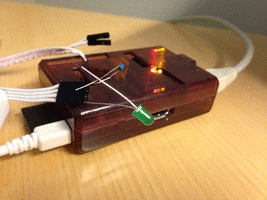go-rpio
Native GPIO-Gophers for your Pi!
go-rpio is a Go library for accessing GPIO-pins on the Raspberry Pi.
It requires no external c libraries such as WiringPI or bcm2835.
There's a tiny bit of additional information over at my blog.
Releases
- 1.0.0 - Supports original rpi A/B/B+
- 2.0.0 - Adds support for rpi 2, by @akramer
- 3.0.0 - Adds support for /dev/gpiomem, by @dotdoom
- 4.0.0 - Adds support for PWM and Clock modes, by @drahoslove
- 4.1.0 - Adds support for edge detection, by @drahoslove
- 4.2.0 - Faster write and toggle of output pins, by @drahoslove
- 4.3.0 - Adds support for SPI, by @drahoslove
- 4.4.0 - Support for disabling interrupts (workaround for #35), by @drahoslove
- 4.5.0 - Improve rpi 4 support, by @wfd3
- 4.6.0 - Adds Balanced PWM mode, by @youngkin
Usage
import "github.com/stianeikeland/go-rpio/v4"
If you're using an older go.mod incompatible you should instead use:
import "github.com/stianeikeland/go-rpio"
Open memory range for GPIO access in /dev/mem
err := rpio.Open()
Initialize a pin, run basic operations. Pin refers to the bcm2835 pin, not the physical pin on the raspberry pi header. Pin 10 here is exposed on the pin header as physical pin 19.
pin := rpio.Pin(10)
pin.Output() // Output mode
pin.High() // Set pin High
pin.Low() // Set pin Low
pin.Toggle() // Toggle pin (Low -> High -> Low)
pin.Input() // Input mode
res := pin.Read() // Read state from pin (High / Low)
pin.Mode(rpio.Output) // Alternative syntax
pin.Write(rpio.High) // Alternative syntax
Pull up/down/off can be set using:
pin.PullUp()
pin.PullDown()
pin.PullOff()
pin.Pull(rpio.PullUp)
Unmap memory when done
rpio.Close()
Also see example examples/blinker/blinker.go
SPI
setup/teardown
rpio.SpiBegin(rpio.Spi0)has to be called first before using any Spi func. It will change pin modes toSpiand initialize default setting.rpio.SpiEnd(rpio.Spi0)should be called at the end, it will switch pin modes toInput.
transferring data
rpio.SpiTransmit(byte)orrpio.SpiTransmit(bytes...)will transmit byte or bytes to slave.rpio.SpiReceive(n)will return n bytes received from slave.rpio.SpiExchange(buffer)will simultaneously transmit data from the buffer to slave and data from slave to the same buffer in full duplex way.
settings
rpio.SpiSpeed(hz)will set transmit speed of SPIrpio.SpiChipSelect(n)will select chip/slave (ce0, ce1, or ce2) to which transferring will be donerpio.SpiChipSelectPolarity(n, pol)set chip select polarity (low enabled is used by default which usually works most of the time)rpio.SpiMode(cpol, cpha)set clock/communication mode (=combination of clock polarity and clock phase; cpol=0, cpha=0 is used by default which usually works most of the time)
Other
Currently, it supports basic functionality such as:
- Pin Direction (Input / Output)
- Write (High / Low)
- Read (High / Low)
- Pull (Up / Down / Off)
- PWM (hardware, on supported pins)
- Clock
- Edge detection
It works by memory-mapping the bcm2835 gpio range, and therefore require root/administrative-rights to run.
Using without root
This library can utilize the new /dev/gpiomem memory range if available.
You will probably need to upgrade to the latest kernel (or wait for the next raspbian release) if you're missing /dev/gpiomem. You will also need to add a gpio group, add your user to the group, and then set up udev rules. I would recommend using create_gpio_user_permissions.py if you're unsure how to do this.
PWM modes will still require root.





